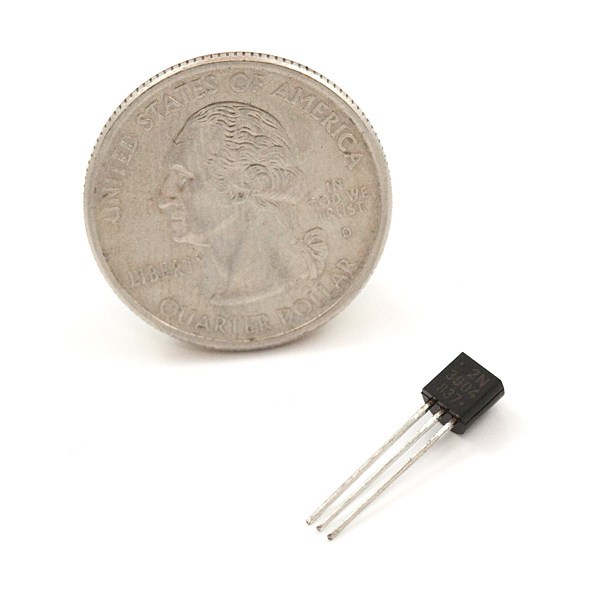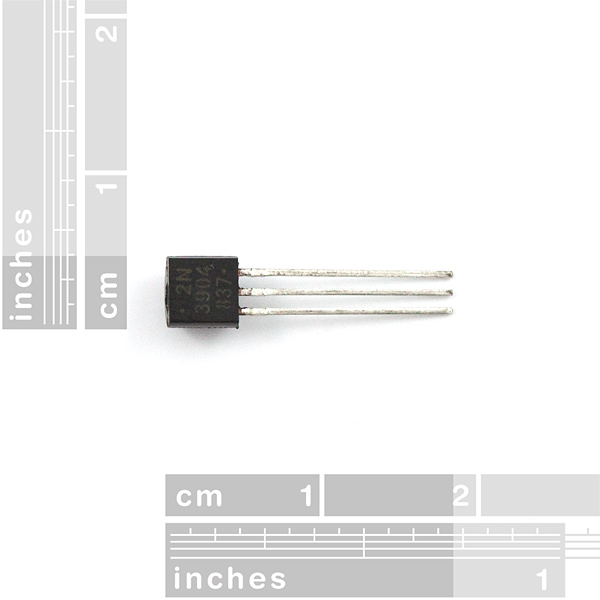Transistor - NPN, 60V 200mA (2N3904)
These are very common, high quality BJT NPN transistors made by ST Micro.
Transistor - NPN, 60V 200mA (2N3904) Product Help and Resources
Transistors
July 1, 2014
A crash course in bi-polar junction transistors. Learn how transistors work and in which circuits we use them.
Interactive 3D Printed LED Diamond Prop
April 19, 2018
In this tutorial, we will learn about how to create an interactive theatrical prop for a performance by 3D printing a translucent diamond prop using a non-addressable RGB LED strip and AT42QT1011 capacitive touch sensing.
Beginner Parts Kit Identification Guide
March 22, 2019
The essential parts for beginning (or even experienced) hobbyists that gives you all of the basic through-hole components you will need to get started playing with embedded projects. We'll identify a few parts in the kit and provide a few basic circuits to get started!
Core Skill: Soldering
This skill defines how difficult the soldering is on a particular product. It might be a couple simple solder joints, or require special reflow tools.
Skill Level: Noob - Some basic soldering is required, but it is limited to a just a few pins, basic through-hole soldering, and couple (if any) polarized components. A basic soldering iron is all you should need.
See all skill levels
Core Skill: Electrical Prototyping
If it requires power, you need to know how much, what all the pins do, and how to hook it up. You may need to reference datasheets, schematics, and know the ins and outs of electronics.
Skill Level: Noob - You don't need to reference a datasheet, but you will need to know basic power requirements.
See all skill levels
Comments
Looking for answers to technical questions?
We welcome your comments and suggestions below. However, if you are looking for solutions to technical questions please see our Technical Assistance page.
Customer Reviews
No reviews yet.



I know that the price of this 2N3904 may be a bit high, but only about a few cents. For home use, it will not break the budget.
https://www.apogeeweb.net/circuitry/2n3904-datasheet-equivalent-pinout.html
as much as i love sparkfun, i think ill stick with ebay for these. 75 cents each is just a bit much for me
Thanks for the suggestion! I was able to pick up 50 for about $2.50. That said, it wouldn't hurt to buy them here if you have a big order going through and just need one or two to complete a circuit.
It is now 0.50 bucks a part...
SPARKFUN. PLEASE SELL BASIC ELECTRICAL COMPONENTS IN LARGER BULK QUANTITIES. $0.75/per is ridiculous.
How does this compare to the NPN transistors that came with my inventor kit? (was P2N2222A )
Taking a look at the datasheets, here is what I see as the major differences: 1) The pin out is reversed, so if you replace the P2N2222A with the 3904 you'll want to have it face the other way. 2) Collector current on the 2222 is 600mA, 3904 is 200mA. For my usage, I wanted to make sure I can switch the 5v relays that come with the inventor's kit and that are sold here on Sparkfun, and these do the trick just fine. :)
That is not correct. The data sheet that I compared between the two shows the same pin out. You can google the datasheet and compare. May be I am missing what the previous guy here was saying but I don't see any difference in the pin out. The collector current in 2222 is more than 3904 so that part is correct. At least on the Fairchild semiconductor datasheet the 2222 collector current is 1A and the 3904 is only 200mA. I did try to follow the inventor kit guide so you have to just make sure that if you are using 3904, you only get 200mA out from it not more. If you use the 2222, I am guessing you probably can get more.
http://www.fairchildsemi.com/ds/PN/PN2222A.pdf http://www.fairchildsemi.com/ds/2N/2N3904.pdf
Whats the max voltage on this?
with this transistor if I apply ground to the base will current flow through?
What's the difference between these and COM-08928? Price? Quality? or maybe the other is ammopack type and that's the only difference?
Any tutorials on how to use this as an inverter? Or maybe some ready inverter component that's not smt?
I found the bottom of this page handy for a simple look at inverters with 2 resistors and an NPN:
http://www.kpsec.freeuk.com/trancirc.htm#inverter
Hi, just wondering if transistors can be used instead of an Opamp to amplify an electret microphone output? Not quite sure what the practical uses are and I've got a ton of these...
Thanks
The practical use of this (and triode vacuum tubes) is allowing a small signal to control a larger one. For a demonstration of this awesomeness, check out MAKE Presents: The Transistor and there is a schematic for a sort of "Pressure controlled LED fader switch" using an NPN transistor in the video.
Op amps have about one tenth the noise as a two transistor setup and 100 times less noise then a single transistor.
What if you want that great transistor sound? A Darlington pair would probably work. Also, (s)he wanted to use up some of their ton of these...
OH! I just found out these wouldn't be good for a practical amp; they're small signal. I tried to amplify a headphone output and I busted 2 of the 3 that I got, their absolute maximum current is 200mA. I should have limited the current from the D battery using a 15Ω resistor.
I sort of want to make to make an 8-bit computer with these transistors.
I actually have been thinking of building a picaxe 08m2 with transistors.
LOL
It's possible, maybe a 2 transistor/ push/pull amplifier.